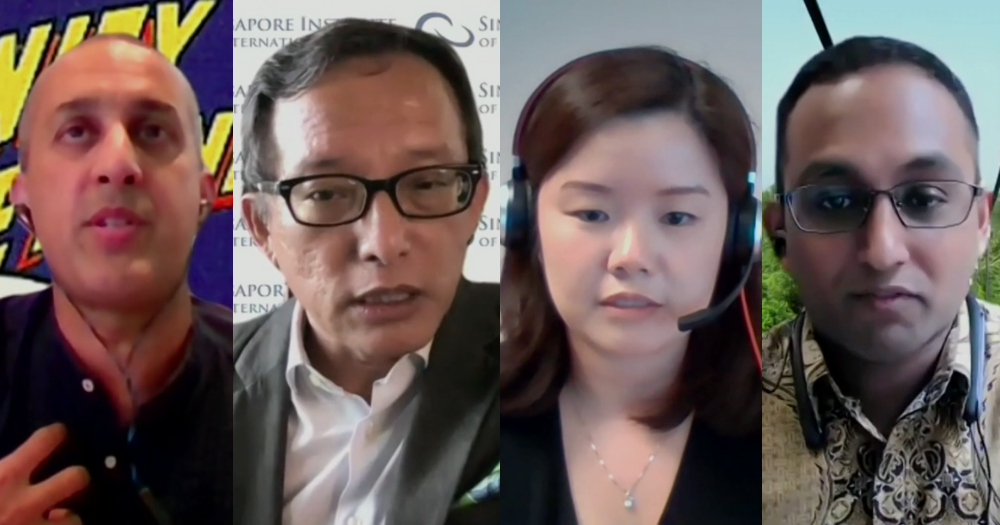Covid-19 and the resulting pandemic has debilitated countries worldwide, leading to mass retrenchments and a huge scramble for each to pick up the shambles of its economy.
One silver lining, however, is how the pandemic could have had propelled countries to pursue their environmental goals along with economic growth.
This — what academics have coined as a "green recovery" — alongside topics such as sustainable jobs, energy, and innovation in the green industry, was discussed at the "Environment and Sustainability" forum on Jan. 12 as part of the 2021 edition of the Institute of Policy Studies (IPS) annual forum, Singapore Perspectives.
Green recovery
Several of the panellists agreed that Covid-19 represents a turning point for countries to reinvent and improve their environmental strategies.
As former three-term Nominated Member of Parliament and the Chairman for the Singapore Institute of International Affairs, Simon Tay said at the forum, Singapore is currently at an "important juncture, an inflection point".
The country would either "get better", or "muddle through" this pandemic, and hit another longer-term roadblock in the future, in the form of climate change and its invisible impacts.
Previously, green recovery was also highlighted by Deputy Prime Minister Heng Swee Keat during his ministerial statement in Oct., 2020.
Looking ahead, Tay proposed for upcoming major infrastructure projects, such as Changi Airport Terminal 5 and the new Tuas mega port, to be hallmark projects for efficiency, innovation, reliability and also sustainability and low-carbon.
"In the past, airports and ports have always been attacked for their carbon miles. So I think that really, we need to demonstrate in our own sort of anchor projects here in Singapore, that the next generation of infrastructure, can really be green."
These projects are also opportunities to establish a green finance market in Singapore.
Singapore can be a "green generator of growth"
Tay also believes that Singapore can be more than a green hub and become a "green generator of growth" for the region by enabling and forming close partnerships in the region.
The importance of forming partnerships with our neighbouring countries was echoed by another panellist, founder of funds management firm Panarchy Partners, Munib Madni.
Nature-based solutions, such as reforestation of mangroves and peatlands, particularly in countries such as Southeast Asia, are potentially viable projects for such partnerships to occur, both said.
Job creation can promote inclusivity in our green recovery
A green recovery has to be an inclusive one too, as one panellist Melissa Low, a research fellow at the Energy Studies Institute, raised concerns over how some stakeholders from the civil society or businesses get excluded from negotiations and meetings.
Tay agreed that inclusivity is important but he is "slightly more optimistic" about the situation.
He said that when more jobs are created from the green economy, also known as the green collar jobs, more people will be involved in the green recovery.
Tay gave an example of something as simple as retrofitting solar panels on existing buildings to increase renewable energy usage in temperate countries. Such duties do not need to be carried out by "rocket scientists", but workers with some training.
Low also said that ensuring workers from fossil fuel-related industries are retrained and transition well to green industries is key.
"Everyone needs to be on board with the message that green collar jobs and a clean economic recovery is essential to building back better, as well as achieving Singapore's climate goals, which will have to be enhanced again in five years under the Paris Agreement," she said.
Time to act
When asked what are some of the best game changers that would drive people's, businesses' and governments' behavioural changes, Tay and Munib, answered with education.
Tay said that while the interest in sustainability among the older generations is low, he has detected a "sea change" in the younger people.
Munib added that educating oneself about environmental issues and the impacts of climate change is crucial to redefining one's professional and personal purpose.
For example, the first step for SMEs to become more sustainable is to be aware of their environmental footprint, financial capabilities notwithstanding.
He assured that different companies can have different environmental targets, and one's financial ability does not limit one's ability to help the environment.
Panellists urged for action over talk, and drove home the idea that there was no other time for players to act.
Low stated that if Singaporeans continue to push the responsibility of addressing climate change to others, the country's environmental goals will never be reached, as "we won't become more ambitious over time".
Founder and director of Sustainable Living Lab, Veerapan Swaminathan added:
"It is time for action, it is time to get things done. And this time will never come again.
This post-pandemic situation, we will never get the opportunity to rewrite the economic story of Singapore, as we get the opportunity right now, so right now is when we gotta do it."
Top photo via screengrab from IPS Singapore Perspectives 2021
If you like what you read, follow us on Facebook, Instagram, Twitter and Telegram to get the latest updates.
